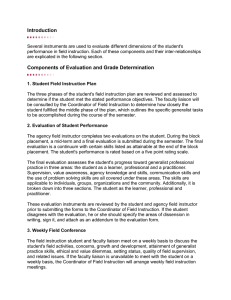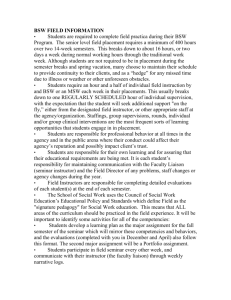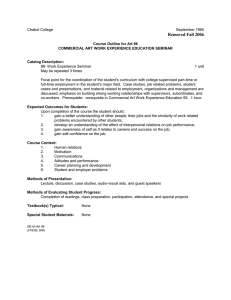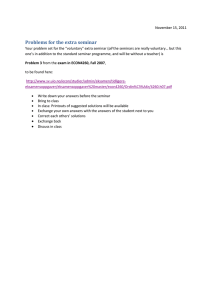Student Conduct And Department Polics
advertisement
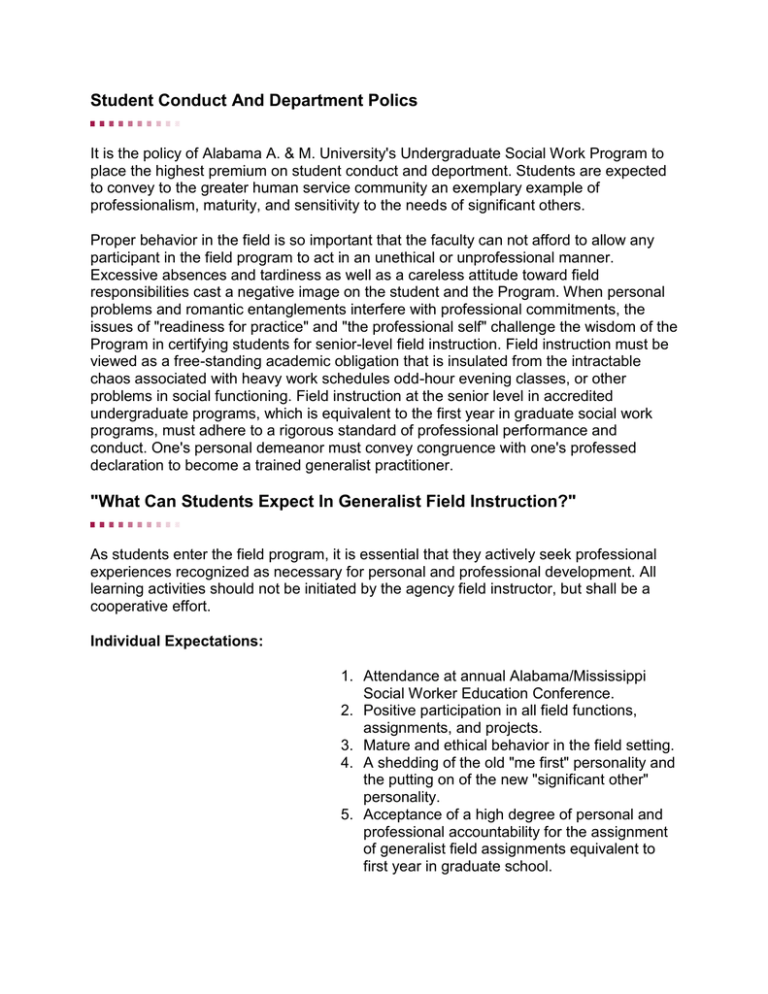
Student Conduct And Department Polics It is the policy of Alabama A. & M. University's Undergraduate Social Work Program to place the highest premium on student conduct and deportment. Students are expected to convey to the greater human service community an exemplary example of professionalism, maturity, and sensitivity to the needs of significant others. Proper behavior in the field is so important that the faculty can not afford to allow any participant in the field program to act in an unethical or unprofessional manner. Excessive absences and tardiness as well as a careless attitude toward field responsibilities cast a negative image on the student and the Program. When personal problems and romantic entanglements interfere with professional commitments, the issues of "readiness for practice" and "the professional self" challenge the wisdom of the Program in certifying students for senior-level field instruction. Field instruction must be viewed as a free-standing academic obligation that is insulated from the intractable chaos associated with heavy work schedules odd-hour evening classes, or other problems in social functioning. Field instruction at the senior level in accredited undergraduate programs, which is equivalent to the first year in graduate social work programs, must adhere to a rigorous standard of professional performance and conduct. One's personal demeanor must convey congruence with one's professed declaration to become a trained generalist practitioner. "What Can Students Expect In Generalist Field Instruction?" As students enter the field program, it is essential that they actively seek professional experiences recognized as necessary for personal and professional development. All learning activities should not be initiated by the agency field instructor, but shall be a cooperative effort. Individual Expectations: 1. Attendance at annual Alabama/Mississippi Social Worker Education Conference. 2. Positive participation in all field functions, assignments, and projects. 3. Mature and ethical behavior in the field setting. 4. A shedding of the old "me first" personality and the putting on of the new "significant other" personality. 5. Acceptance of a high degree of personal and professional accountability for the assignment of generalist field assignments equivalent to first year in graduate school. 6. Recognition of the art of rapport building as a life-long trait. 7. Controlled emotional involvement in stressrelated aspects of functioning in the "world of work" while maintaining a demanding academic and extra-curricular workload. 8. Coordinate all alternative arrangements to the established field schedule with his/her faculty advisor and Coordinator of Field Instruction, prior to presenting alternative plans to the agency field instructor. 9. Attendance at yearly AIDS Community Workshop. 10. Attend a minimum of three area wideworkshops, 11. conferences, lectures or seminars. 12. Keep Field Instruction Plan updated. 13. Keep accurate record of 480 field hours. Seminar Expectations: 1. Participation in all seminar activities. 2. Contribute to the seminar agenda by assuming an identifiable responsibility during the semester. 3. Balanced pacing of field responsibilities with personal/social/academic obligations. 4. Use of self as a role model for the positive accomplishment of individual and group goals. 5. Refrain from scheduling other classes during seminar period. 6. Attend computer literacy training. Students Are Encouraged To: 1. Explore new ideas and approaches in assigned tasks. 2. Show enthusiasm on the job. 3. Form meaningful relationships with peers and colleagues. 4. Attend meetings, conferences, programs sponsored by field placement agencies at times other than field days. 5. Subscribe to professional journals. 6. Participate in field trips for professional enrichment. 7. Refrain from engaging in non-agency activities on field days (i.e. homework, recreation, pledging, etc.) 8. Understand community resources and their application to client self-determination. 9. Be industrious and work independently. 10. Display sensitivity to others. 11. Be professional and dependable. 12. Join NASW and participate in its liability insurance program. 13. Have automobile insurance and arrangements for transportation. Student Field Instruction Contract Agency field instructors and students will cooperatively develop a contract, which outlines the activities students are to undertake during the field experience. Students are required to list social work learning experiences that they would like to have during the placement. Upon completion, this form is given to the Coordinator of Field Instruction for review. The field instructor and student sign the form as an agreement that the activities listed will be engaged in. Additional activities can be added as the student progresses and becomes aware of the variety of experiences within the agency. This exercise allows the Coordinator of Field Instruction to monitor the types of activities desired and to ensure activities that offer experience with individuals, families, groups, organizations and community. The contract is structured in terms of the generalist approach. It is the responsibility of the student to ensure that the form is completed on time. Student Evaluation The student evaluation is an instrument used to summarize the student's performance from the first day of the placement. It is an on-going process. The evaluation is the agency field instructor's assessment of the student's progress and difficulties in achieving agreed upon objectives. There are two evaluation periods during the block placement: mid-term and final. The field evaluation instrument is planned to assess the level of attainment of a variety of social work generalist skills appropriate to senior-level field instruction. The instrument is comprised of three sections: student as a learner, professional and practitioner. Through this on-going assessment, the Faculty Liaison and Coordinator of Field Instruction are able to monitor activities and identify areas of growth. Each student is responsible for his/her own growth and development as a byproduct of the ongoing evaluative process established by the Program. Some of the procedures available to the student to ensure constant evaluation are listed below. Review of Weekly Reporting Forms Student activity is monitored through written reports. The student prepares a summary of events that have taken place as he/she interacts with individuals, groups, organizations and communities. He/she may also make a presentation in a seminar meeting on the techniques used by the student to achieve the desired goals of the field instruction plan. A Weekly Reporting Form is submitted at the end of each week. The Seminar Course This seminar permits field instruction students in different field settings to share and benefit from their numerous and varied learning experiences. This seminar is held to evaluate, discuss, and interpret students' field learning. Students share why they feel they were effective in carrying out activities. The techniques, which were used are discussed so that the students are aware of what has worked and what can be repeated. Activities, which are not successful are also discussed. This allows students an opportunity to examine their strengths and weaknesses and think of ways to improve their effectiveness. The dialogue between the students and the Coordinator of Field Instruction enhances the monitoring of activities in the agencies. Scheduling Individual Student Conferences Feedback from students gives the Coordinator of Field Instruction and faculty liaison information on the kinds of activities engaged in and the kinds of activities desired. This reinforces student self-assessment, aids progress and growth and identifies gaps in learning experiences. The faculty liaison plays a key role in meeting with students on a weekly basis. Termination from Agency Students need to be helped to learn that termination is an important skill. They need to recognize that this process is not merely a matter of termination from the client services, but from the agency as well. Students, therefore, have to be helped with this process during their field placement, but they must initiate and monitor their own termination from the agency near the end of their block placement. Social Work Roles In Generalist Field Placements 1. Outreach worker - implies an active reaching out into the community to detect people with problems and help them to find help, and to follow up to assure that they continue toward as full as possible a fulfillment of their needs. 2. BROKER - involves helping a person or family get to the needed services. It includes assessing the situation, knowing the alternative resources, preparing and counseling the person, contacting the appropriate service and assuring that the client gets to it and is served. 3. ADVOCATE - pleading and fighting for services for a single client whom the service system would other wise reject (regulations, policies, practices, etc. 4. EVALUATION - involves gathering information, assessing client or community problems, weighing alternatives and priorities and making decisions for action. 5. TEACHER - includes a range of teaching from simple teaching (i.e. how to dress, how to plan a meal) to teaching courses in budget or home management, to teaching in staff development programs; teaching aims to increase peoples' knowledge and skills. 6. BEHAVIOR CHANGER - includes a range of activities directed to changing people's behavior rather precisely. Among them are simple coaching, counseling, behavior modification and psychotherapy. 7. MOBILIZER - involves working to develop new facilities, resources and programs or to make them available to persons who are not being served. 8. CONSULTANT - involves working with other persons or agencies to help them increase their skills and to help them in solving their clients' social welfare problems. 9. COMMUNITY PLANNER - involves participating and assisting in planning of neighborhood groups, agencies, community agents or governments in the development of community programs to assure that the human service needs of the community are represented and met to the greatest extent feasible. 10. CARE GIVER - involves giving supportive services to people who are not able to fully resolve their problems and meet their own needs, such as supportive counseling, fiscal support, protective services, day care, 24 hour care. 11. DATA MANAGER - includes all kinds of data gathering, tabulating, analysis, and synthesis for making decisions and taking action. It ranges from simple case data gathering through preparing statistical reports of program activities to evaluation and sophisticated research. 12. ADMINISTRATOR - includes all of the activities directed toward planning and carrying out a program such as planning, personnel, budgeting, fiscal operation, supervising, directing and controlling.
